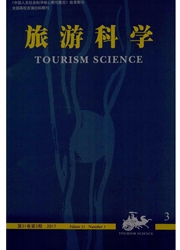

 中文摘要:
中文摘要:
旅游目的地意象是20世纪70年代以来,地理学和旅游学等学科交叉生成的研究命题,是旅游目的地市场细分、市场定位及竞争分析的重要工具。本文选择中国近缘文化群体客源市场,也是中国最大的入境客源市场韩国为研究对象,以非结构式和结构式研究相互结合的方式,研究分析了韩国潜在游客对中国的旅游目的地意象认知及行为意图,研究结果显示:(1)韩国潜在游客对中国的旅游目的地意象认知由四个基本维度构成,分别是平和、愉悦、动感与现代,其中,平和、愉悦和现代与旅游目的地意象呈正相关关系;(2)韩国潜在游客对中国的旅游目的地意象认知与其行为意图呈正相关关系;(3)中国旅游目的地意象的平和、愉悦特征对韩国潜在游客行为意图有明显的正向影响,呈正相关关系。
 英文摘要:
英文摘要:
Tourist destination image, a proposition generated from geography, tourism, planning science and other interdisciplinary, has been an important tool in market segmentation of tourism destination, market positioning and competitive analysis. This paper selected South Korea market, a close cultural group and China' s largest inbound tourism market as a case in point, combined unstructured and structured research methods to study potential South Korean tourists' image cognition and behavioral intentions of Chinese tourist destinations. The result indicates : ( 1 ) tourist destinations for potential South Korean tourists is consisted of peace, joy, dynamic and modem, with peace, joy and modem positively correlated with tourist destination image; (2) There is a positive correlation between tourist destination image and behavioral intentions of the potential South Korean tourists ; ( 3 ) Peace and joy features of Chinese destination image have a significant positive impact on behavioral intentions of potential South Korean tourists. The paper ends with an explanation of the untouched areas of this research and the directions for future studies.
 同期刊论文项目
同期刊论文项目
 同项目期刊论文
同项目期刊论文
 期刊信息
期刊信息
